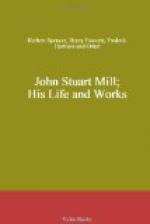I have just remarked that Mill’s originality is less conspicuous in relation to the economic theory of land than in other problems of political economy, but the reader must not understand me from this to say, that he has not very largely contributed to the elucidation of this topic. He has indeed done so, though not, as is commonly supposed, by setting aside principles established by his predecessors, but, as his manner was, while accepting those principles, by introducing a new premise into the argument. The new premise introduced in this case was the influence of custom as modifying the action of competition. The existence of an active competition, on the one hand between farmers seeking farms, on the other between farming and other modes of industry as offering inducements to the investment of capital, is a constant assumption in the reasoning by which Ricardo arrived at his theory of rent. Granting this assumption, it followed that farmers as a rule would pay neither higher nor lower rents than would leave them in possession of the average profits on their capital current in the country. Mill fully acknowledged the force of this reasoning, and accepted the conclusion as true wherever the conditions assumed were realized; but he proceeded to point out, that, in point of fact, the conditions are not realized over the greater portion of the world, and, as a consequence, that the rent actually paid by the cultivators to the owners of the soil by no means, as a general rule, corresponds with that portion of the produce which Ricardo considered as properly “rent.” The real regulator of actual rent over the greater part of the habitable globe was, he showed, not competition, but custom; and he further pointed out that there are countries in which the actual rent paid by the cultivators is governed neither by the causes set forth by Ricardo, nor yet by custom, but by a third cause different from either,—the absolute will of the owners of the soil, controlled only by the physical exigencies of the cultivator, or by the fear of his vengeance if disturbed in his holding. The recognition of this state of things threw an entirely new light over the whole problem of land-tenure, and plainly furnished grounds for legislative interference in the contracts between landlords and tenants. Its application to Ireland was obvious; and Mill himself, as the world knows, did not hesitate to urge the application with all the energy and enthusiasm which he invariably threw into every cause that he espoused.




